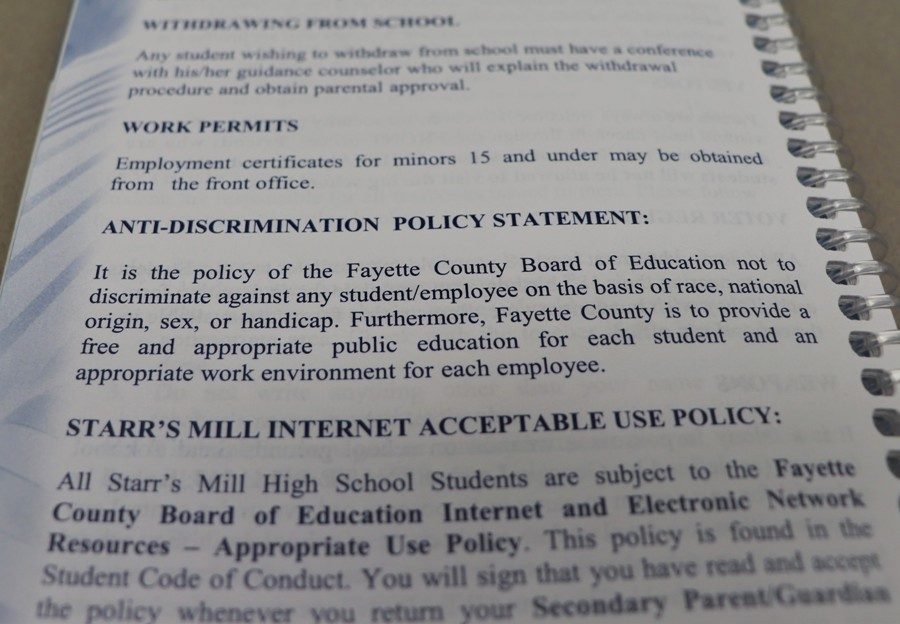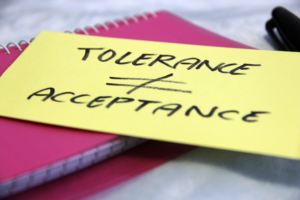Broad term usage confuses citizens
Legal documents use the term “sex” differently than the LGBTQ+ community
The student anti-discrimination policy is found on page 30 of the Starr’s Mill High School student agenda. Though the policy is technically inclusive, it neglects to differentiate between sexuality and gender.
October 20, 2017
In the years leading up to 2017, the United States has made great strides toward recognizing and accepting various members of the LGBTQ+ community. Starr’s Mill is no stranger to these progressive decisions, adding gender neutral bathrooms in 2016 and creating a Gay Straight Alliance club in 2017.
On a national level, however, progress has been stunted with the election of Donald Trump who, in the first 100 days of his reign, has enacted many anti-LGBTQ+ policies and practices that worry the LGBTQ+ community. The day after sworn into office the LGBTQ+ related content from the Department of State website was taken down. Then ten days later there was a leaked draft of the “Religious Freedom” act which allowed businesses to discriminate and refuse service to LGBTQ+ people and many LGBTQ+ people were glad it was not signed into law. Then on Feb. 22 the federal jurisdiction over facilities for transgender people was essentially repealed and the power was given to the states.
Many of Trump’s anti-LGBTQ+ policies made community members uncertain of their safety in the U.S. This means it is especially important nowadays for the people of the LGBTQ+ community to be aware of their rights so they are not treated unjustly.
As much as the LGBTQ+ community is aligned together on the purpose of progressiveness, the community and government are not always aligned when it comes to the usage of terms like gender identity, sex, and sexual orientation.
Many times the legal meanings of a word differ from the common vernacular of society, but when it comes to discrimination people need to able to recognize their individual rights. “They should really make it clear that LGBTQ+ is protected in discrimination under the [Fayette County Code of Conduct and Starr’s Mill student handbook],” junior Jane Lawrence said.
The 2017-2018 Fayette County Code of Conduct states, “the Fayette County School District does not discriminate based on race, color, religion, national origin, age, disability or gender in employment decisions or educational programs and activities, including its athletic programs.”
Conversely, at the bottom of the Fayette County website, the discrimination statement says, “Fayette County Public Schools does not discriminate on the basis of race, color, religion, sex, national origin, age or disability in any of its educational programs, employment practices, or other services and activities.” The only difference in the Code of Conduct and the statement on the Fayette County website is that the website uses the term “sex.”
The LGBTQ+ community does not seem to have a set definition for the term “sex,” but even at the national level, the discrimination policy uses “sex” to mean sexuality/perceived sexual orientation and gender according to the U.S. Equal Employment Opportunity Commission.
Meanwhile, the 2017-2018 Starr’s Mill student handbook’s discrimination policy says no one is allowed to “discriminate against any student/employee on the basis of race, national origin, sex, or handicap.” This policy also legally includes gender and sexual orientation, but without further research into government documents the general public may interpret the policy to be non-inclusive of the LGBTQ+ community.
The government and LGBTQ+ community needs to unite on single definitions for key terms like “sex” to eliminate confusion and unify our society.








Zach Garcia • Dec 7, 2017 at 10:17 am
I believe that some of the language used is biased in the vocabulary and in a sense I feel like the argument of this document is a skewed double standard. As much as members of the LGBTQ+ community have individual rights, so do those who do not participate in the community. Business owners have a right to choose who they serve or hire as much as any other business and the consequences of possibly losing customers falls on the owner. The idea that others must lose or restrict their individual freedoms to accommodate for people whom already have equal rights but still choose to fight for them is almost un-American.